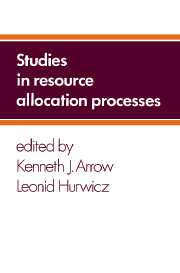
-
Select format
-
- Publisher:
- Cambridge University Press
- Publication date:
- 04 April 2011
- 30 November 1977
- ISBN:
- 9780511752940
- 9780521215220
- 9780521034005
- Dimensions:
- (204 x 159 mm)
- Weight & Pages:
- 0.866kg, 500 Pages
- Dimensions:
- (228 x 152 mm)
- Weight & Pages:
- 0.75kg, 500 Pages
- Subjects:
- Economics, Microeconomics, Macroeconomics
You may already have access via personal or institutional login- Subjects:
- Economics, Microeconomics, Macroeconomics
Book description
One of the central questions of economics relates to the coordination of individual units within a large organization to achieve the central objectives of that organization. This book examines the problems involved in allocating resources in an economic system where decision-making is decentralized into the hands of individuals and individual enterprises. The decisions made by these economic agents must be coordinated because the input decisions of some must eventually equal the output decisions of others. Coordination arises naturally out of the mathematical theory of optimization but there is still the question of how it can be achieved in practice with dispersed knowledge. The essays here explore the many facets of this problem. Nine papers are grouped under the title 'Economies with a single maximand'. They include papers on static and dynamic optimization, decentralization within firms, and nonconvexities in optimizing problems. Fourteen papers are concerned with 'Economies with multiple objectives'. Among the topics covered here are stability of competitive equilibrium, stability in oligopology, and dynamic shortages. The final part of the book includes three papers on informational efficiency and informationally decentralized systems.Leonid Hurwitcz is the Nobel Prize Winner 2007 for The Sveriges Riksbank Prize in Economic Sciences in Memory of Alfred Nobel, along with colleagues Eric Maskin and Roger Myerson, for his work on the effectiveness of markets.
Contents
Metrics
Altmetric attention score
Full text views
Full text views help Loading metrics...
Loading metrics...
* Views captured on Cambridge Core between #date#. This data will be updated every 24 hours.
Usage data cannot currently be displayed.
Accessibility standard: Unknown
Why this information is here
This section outlines the accessibility features of this content - including support for screen readers, full keyboard navigation and high-contrast display options. This may not be relevant for you.
Accessibility Information
Accessibility compliance for the PDF of this book is currently unknown and may be updated in the future.


